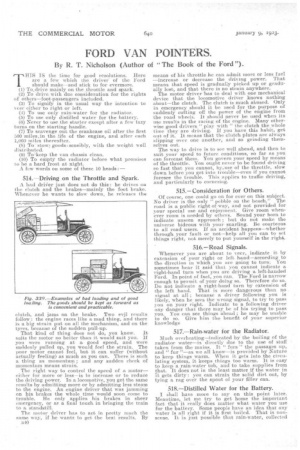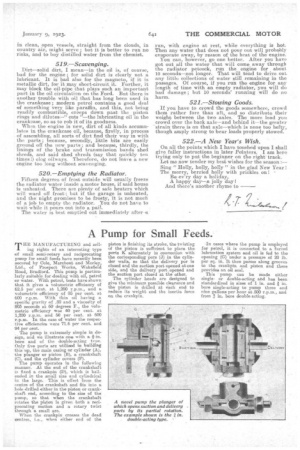FORD VAN POINTERS.
Page 26

Page 27

If you've noticed an error in this article please click here to report it so we can fix it.
By R. T. Nicholson (Author of "The Book of the Ford ").
THIS IS the time for good resolutions. Here are a few which the driver of the Ford should make—and stick to for evermore.
(1) To,drive mainly on. the throttle and spark. (2) To drive._ with due consideration for the rights of others—foot-passengers included. (:3) To signify in the usual way the intention to veer either to right or left. (4) To use only rain-water for the radiator. (5) To use only distilled water for the battery. (6) Never to use the starter except after a few lazy turns on the starting handle.
(7) To scavenge out the crankcase oil after the first 600-mi1es,in tha life of the engine, and after each 1,000 miles thereafter.
(8) To " stow,, goods, sensibly, with the weight well distributed.
(9) To'keep the van chassis clean. (10) To empty the radiator before what promises to be a hard frost at night. • . A few words on some of these 10 heads :—
514.—Driving on the Throttle and Spark.
A had drier just does not do this: he drives on the clutch and the brakes—mainly the foot brake. Whenever he wants to slow down, he releases thQ clutch, and jams on the brake. Two evjl results follow the engine races like a mad thing, and there is a big strain put on all the mechanism, and on the tyres, because of the sudden pull-up. That kind of thing -does not do, you know. It suits the motor no better than it would suit you. If you were running at a good speed, and were suddenly pulled up, you would feel the strain. The poor motor cannot feel, but it can suffer (without actually feeling) as much as you Can. There is such a thing as momentum ; and any sudden cheek of momentum means strain.
The right way to control the speed of a motor— either for more or less—is to increase or to reduce the driving power. In a locomotive, you get the same results by admitting more or by admitting less steam to the engine. An engine driver that was jamming on his brakes the whole time would soon come to trouble. He only applies his brakes in sheer emergency, or as a final touch in bringing the train to a standstill.
The motor driver has to act in pretty much the same way, if he wants to get• the best results. By B40 means of his throttle he can admit more or less fuel —increase or decrease the driving power. That means that speed is gradually picked up or gradually lost, and that there is no strain anywhere.
The motor driver has to deal with one mechanical device that. the locomotive driver .knows nothing about—the clutch. The clutch is much abused. Only in emergency should it be used for the purpose of suddenly cutting off the power of the engine from the road wheels. It should never be used -when its use results in the racing of the engine. Many otherwise good drivers " play with " the clutch the whole time they are driving. If you have this habit, get out of it. it means that the clutch plates are always slipping over one another, and so grinding themselves out.
The way to drive is to see well ahead, and then to suit your speed to future conditions, so far as you can forecast them. You govern your speed by means of the throttle. You ought WW1' to be found driving so fast that you cannot, by,use of the throttle, .slow down before you get into trouble—even if you cannot foresee the trouble. This applies to traffic driving, and particularly to cornering.
515.—Consideration for Others.
Of course, one could go on for ever on this subject. No driver is the only " pebble on the beach." The road is -a public right-of-way, and not provided for your special use and enjoyment. Give room whenever room is needed by others_ Sound your horn to indicate unseen approach ; but do not make the universe hideous with your snarling. Be courteous to all road users. If an accident happens—whether through your fault or not—help all you can to set things right, not merely to put yourself in the right.
516.—Road Signals.
Whenever you are about to veer, .indicate it, by extension of your right or left hand—according to the direction in which you are going to turn. You sometimes hear it said that you cannot indicate a right-band turn when you are driving -a left-handed Ford. In point of fact, you can. The Ford is narrow enough to permit of your doing so. Therefore do so. Do not indicate a right-hand turn by extension of the left hand. That is more dangerous than no signal at all ; because a driver following you is likely, when he sees the wrong signal, to try to pass you on your right. Indicate to a following driver any danger that there may be of his trying to pass you. You can see things ahead ; he may be unable to do so. Give him the benefit of your superior knowledge
517.—Rain-water for the Radiator.
Much overheating—indicated by the boiling of the radiator water—is directly due to the use of stuff taken from the mains_ It " furs" the passages up, and "fur "—as we all know—is provided by Nature to keep things warm. When it gets into the circulating system, it keeps thiags too warm. It is easy to keep a rain-water tub, and to take supplies from that. It does not in the least matter if the water in it gets dirty : you can strain the solid dirt out, by tying a rag over the spout of your filler can.
518.—Distilled Water for the Battery. I shall have more to say on this point later. Meantime, let me try to get home the important i
fact that t really does matter what water you use for the battery. Some people have an idea that any water is all right if it is first boiled. That is nonsense. It is just possible that rain-water, collected in clean, open vessels, straight from the clouds, in country air, might serve; but it is better to run no risks, and to buy distilled water from the chemist.
519.—Scavenging.
Dirt—solid dirt, I mean—in the oil is, of course, bad for the engine ; for solid dirt is clearly not a lubricant. It is bad also for the magneto, if it is metallic dirt, for it may short-circuit it. Further, it may block the oil-pipe that plays such an important part in the oil circulation on the Ford. But there is another trouble with oil that has long been used in the crankcase; modern petrol contains a good deal of something very like. paraffin, and this, not being readily combustible, creeps down past the piston rings and dilutes=" cuts "—the lubricating oil in the crankcase, so as to rob it of its goodness.
When the engine is news dirt of all kinds accumulates in the crankcase oil, because,, firstly, in process • of assembling, all sorts of dirt find their way in with the parts; because, secondly, little bits are easily ground o the new partsand because, thirdly, the linings of the brake and transmission bands shed shreds, and said shed shreds (say that quickly ten times 0 clog oilways. Therefere, do not leave a new engine toe long without scavenging.
520.—Emptying the Radiator.
Fifteen degrees of frost outside will usually freeze the radiator water inside a motor house, if said house is unheated. There are plenty of safe heaters which will ward off frost ; but if the garage is unheated, and the night promises to be frosty, it is not much of a job to empty the radiator. You do not have to wait while it pours out into a pail.
The water is best emptied out immediately after -a run, with engine at rest, while everything is hot. Then any water that does not pour out will probably evaporate away, by reason of the heat of the engine.
You can, however, go one better. After you -havo got out all the water that will come away through the radiator petcock, rim the engine kr about 10 seconds—not longer. That will tend to drive out any little collections of water still remaining in the passages. Of course, if you run the engine for any length of time with an empty radiator, you will do had damage ; but 10 seconds' running will do no harm.
521.—Stowing Goods.
If you have to crowd the goods somewhere, crowd them rather fore than aft, and so distribute their weight between the two axles. The more load you crowd over the back axle—and behind it—the greater strain there is on that axle—which is none too hefty, though amply strong to bear loads properly stowed.
522.—A New Year's Wish,
On all the points which I have touched upon I shall give fuller instructions in later Pointers. I am here trying only to put the beginner on the right track. Let me now tender my best wishes for the season :— Sing " Holly, holly, holly "in the glad New Year I The merry, berried holly with prickles on I Be ey'ry day a holiday, A happy day—a jolly day And there's another rhyme to
































